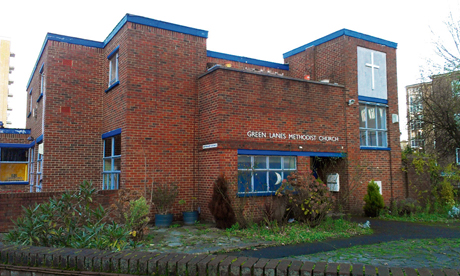Green Lanes Methodist Church to become seven storey tower block

No affordable housing: council says ‘exceptions are not uncommon when it can be justified’. Photograph: Adam Barnett
Green Lanes Methodist Church is set to become a seven storey tower block as part of a development that has been met with hostility by local residents, who say the council is paying ‘lip-service’ to their concerns.
The plan to rebuild the church with a nursery and a place of worship on the ground floor and six storeys of flats above was approved by the council on Wednesday 5 December. Cllr Linda Smith was the only member of the planning committee to vote against the proposals.
Oliver Cox, a local resident and member of the Burma, Arakan and Clissold Tenants and Residents Association, said he was shocked by the decision. “It doesn’t feel like I’m living in a democracy,” he said after the vote. Mr Cox said he would be seeking legal advice on a judicial review.
Residents object to the size of the new block, which will be the tallest in the area so close to a main road, affecting the amount of sunlight reaching local flats and allotments. They are, in addition, concerned about the resulting reduction in open space, which the council is committed to preserving in its Core Strategy.
Residents also object to the planned disruption of New River Walk, a historical trail through the borough that dates back to the reign of James I, and which will celebrate its 400th anniversary next year.
Mr Cox criticised the council report which informed the planning committee about the application. He said the report reduced local residents’ objections to basic headings, whilst the case in favour of the proposals was stated at length.
“They’ve only been presented with one side of the argument,” said Mr Cox, whose kitchen window overlooks the site of the proposed building. “It’s quite extraordinary.”
Thierry Ploum, an architect and local resident who sent a 16 page objection letter to the planning officer, said the council’s lack of historical research about the site was “staggering.”
The plans for the tower block are at odds with Hackney council’s pledges to create affordable housing, as none of the accommodation it provides will qualify. The Council’s report states: “Officers have taken the view that whilst no affordable housing is proposed as part of the development this should not constitute a grounds for refusing the application as there are still substantive benefits to the local community.
“However, a review mechanism will be included [to] ensure that if residential values do increase, monies can be clawed back towards affordable housing.”
Mustafa Korel, a Hackney Green Party spokesperson, criticised the proposals. “It’s another typical example of big developers swanning into Hackney without consulting the people who actually live there,” he said. “Why can’t developers look at the heritage of the place? Looking at the area rather than what they want to impose on the area?
“It’s totally unfair that it might cause damage to that area without a proper assessment being done.”
Mr Korel also criticised the planning report and the council, saying: “It makes me really angry what the subcommittee said about affordable housing, because it’s not clear what community support or other benefit it might bring to the area.
“What’s the point of having a policy you’re not going to keep to? You pick and choose as and when you want to? That’s not a democracy. That’s a design by Hackney council to invite gentrification and a fractured community.”
Cathy Bird, Superintendent Minister at the church, said at the meeting that the church is in need of redevelopment and could not secure funding another way. They are therefore working in partnership with London Wharf, a development company.
A spokesperson for project developers London Wharf said that churches are “not development experts,” and that some churches they work with are “facing an uncertain future.” Speaking before the planning committee’s decision, he said that council officers had looked at residents’ objections and that they “don’t find any merit in them.” He said they “have recommended the other way” and been “very complimentary” about the proposals, which he said would “provide community services including nursery facilities, for which there is much demand, provided at a reasonable rate and of a high quality, so the kids can have a better play space.”
A spokesperson for Hackney Council defended its report, saying that “objections are always summarised in the officer’s report as are all consultee responses,” and that “full responses are publicly available to view on request.”
On the absence of affordable housing in the plans, the spokesperson said: “Exceptions are not uncommon when it can be justified. In this case the proposal includes providing new and enhanced community facilities as well as rebuilding a new church.
“The New River historic river bed does run through the site on its eastern boundary. The proposed new building on site would partially encroach onto the route of the historic river bed. However, it is not statutorily protected or protected through planning policy from being developed on.
“There is a slight reduction of open space on site, but planning policy allows exceptions to be made where the new open space is of a better quality which is applicable in this case.”
